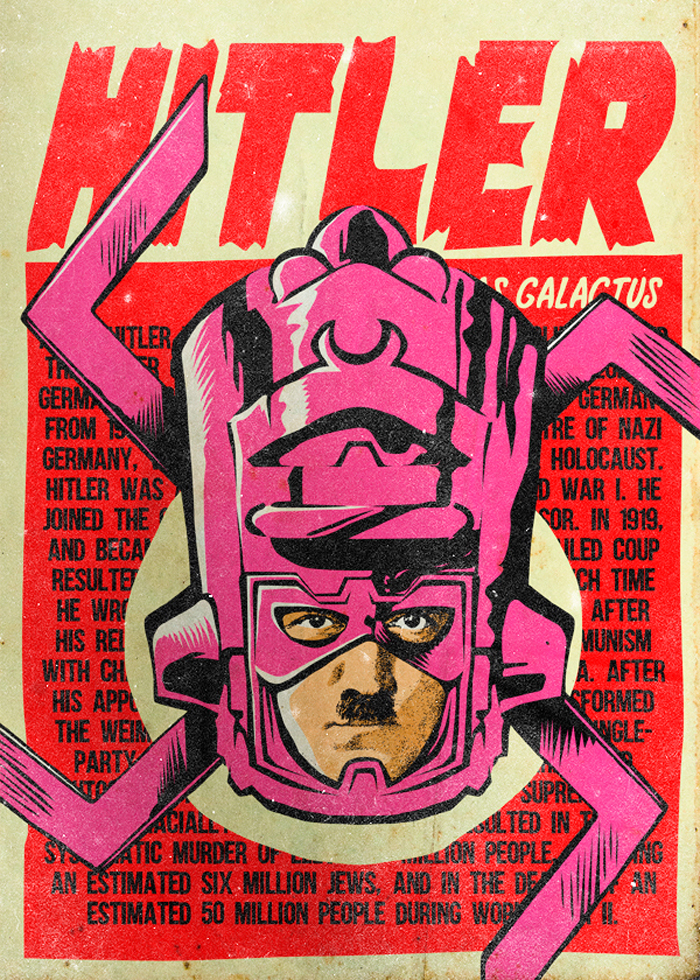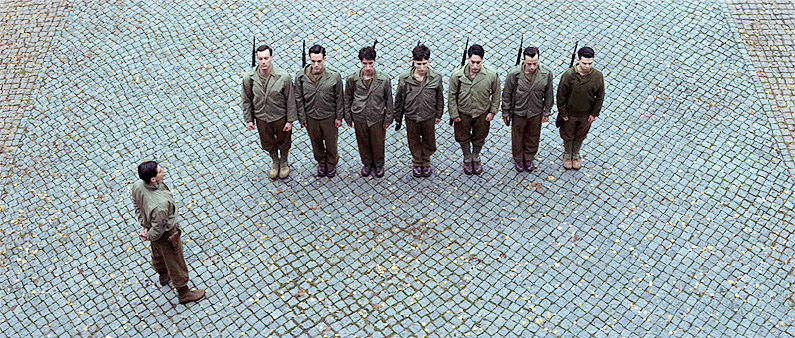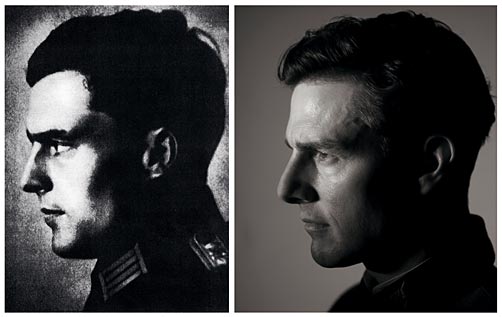
Don’t turn around, uh oh. Der Kettle Fuhrer’s in town, uh oh. If I remember correctly, this teapot with an ill-favored look is an exact replica of the one once used in a small boarding house in Minehead, Somerset. “Sorry Mein Dickey Old Chum!”
Haunting the Web Since 1999

Don’t turn around, uh oh. Der Kettle Fuhrer’s in town, uh oh. If I remember correctly, this teapot with an ill-favored look is an exact replica of the one once used in a small boarding house in Minehead, Somerset. “Sorry Mein Dickey Old Chum!”



Perhaps part of the reason I enjoyed the film was that I went in with egregiously low expectations. Particularly with Hostel director Eli Roth skulking about the premises — he’s Donny Donowitz, a.k.a. the “Bear Jew,” a Boston-born basterd who likes to go yahd on Nazi skulls with his Louisville Slugger — I went in thinking that this movie would basically be two and a half hours of grisly torture porn — or , in other words, the ear scene from Reservoir Dogs over and over again, made “ok” because the victims are Nazis. But Inglourious Basterds is both broader and more subtle than that. Yes, there’s some of that going on — particularly in Chapter 2 — but it’s handled much more expertly than I feared. (Nor are the victims in question just cartoon Nazis out of Raiders of the Lost Ark, but multi-dimensional individuals in a huge spot of trouble.)
And, in any case, the Basterds are really a small part of the film as a whole. Borrowing liberally from The Good, The Bad, and The Ugly at the start, the movie begins in 1941 France with the interrogation of a French farmer (Denis Menochet) who may or may not be harboring his Jewish neighbors. His interlocutor is the courtly SS Colonel Hans Landa (Christophe Waltz, a bit over-the-top but probably a shoo-in for a Supporting Actor nod) who, in a wide-ranging conversation about milk, hawks, pipes, and paperwork, methodically picks apart the poor dairy farmer like a boy pinning down a butterfly. Then, we meet the Basterds, the elite unit of Jewish soldiers — led by “Aldo the Apache” Raine (Brad Pitt, also playing it broad) — who are kicking ass and taking manes all across Europe. Their dastardly exploits have even caught the attention of the German High Command — including the Fuhrer himself (Martin Wuttke), who wants them dead, like, yesterday. (Speaking of which, the early scenes in the FHQ, with Hitler throwing a tantrum over the Basterds, felt a lot like how I’d imagine a WWII-era Captain America film might pan out.)
Minister of Propaganda Joseph Goebbels (Sylvester Groth), meanwhile, is more interested in getting his newest propaganda film — A Nation’s Pride, about the Sgt. York-like heroics of one German sniper (Daniel Bruhl) — the grand opening it deserves in Nazi-occupied Paris. To that end, and on the advice of said sniper (who’s a bit smitten with the proprietor), he looks to book the premiere at a theater run by a melancholy French beauty named Emmanuelle Mimieux (Melanie Laurent). But Emmanuelle, it turns out, is in fact named Shoshanna — we met her earlier in the film — and she more than most has a score to settle with these godawful Nazis. And, like Herr Goebbels, she knows a thing or two about using the cinema to make a dramatic statement…
I haven’t even mentioned the German actress/double-agent Bridget von Hammersmark (Diane Kruger), or the dashing British film critic-turned-lieutenant, Archie Hicox (Michael Fassbender), or Hugo Stiglitz (Til Schweiger), the expert Nazi-killer sprung by the Basterds for bad behavior, or military mastermind Gen. Ed Fenech (Mike Myers, distracting but getting to live out his Peter Sellers dream some more), the man with a plan to knock out the German High Command in one fell swoop. Yes, this film is a truly baroque creation. It’s more a collection of loosely-related setpieces, to be honest, and some work better than others (A vignette involving a rendezvous-gone-south in a basement pub is a masterpiece of slowly-ratcheting suspense; the scene where Shoshanna is forced to eat dinner with a gaggle of Nazis feels ten minutes too long.)
Although most of the speaking here is conducted in French, German, or really-bad Italian (it’s all lovely to listen to, by the way — the musicality of QT’s dialogue definitely carries over into other languages), this is a Tarantino movie through and through. We have the long, meandering conversations punctuated by staccato bursts of violence. (See also: Any other Tarantino film.) We have the throwback homage-ridden score (Mostly Morricone, but David Bowie’s “Cat People” shows up in a truly odd spot.) We have the random digressions on “Pop Culture According to QT.” (There’s an extended riff on King Kong here that momentarily took me out of the film.) We have an obvious lapse into foot fetishism (the Cinderella scene, which, imho, doesn’t make much sense given what happens later.) There are, of course, several Mexican standoffs. It’s all very Tarantino, alright.
And we have the powerful ending, which I won’t give away in detail here. [Warning: This rest of this review is spoilerish.] As several characters say in Chapter 5, “the shoe’s on the other foot now.” And it is — After the tension-wracked first chapter, Basterds completely inverts the usual Cat-and-Maus relationship inherent to almost all movies of this genre. The political economy of IB is hardly what you’d call Zen, and if “turn the other cheek” is your moral touchstone, then the ending is deplorable in many ways. (Even Tarantino seems to think so, given that we the audience have basically the same reaction to Basterds as the Nazis do to A Nation’s Pride.) That being said, it’s a weirdly and undeniably intoxicating thing to see the Jewish Basterds being the guys holding the guns for once, and to witness their disembodied, cackling Avenging Angel exult in a vengeance long denied.
After all its Eurocinema-meets-The Dirty Dozen twists-and-turns, Inglourious Basterds ends up being a sort of a Leni Riefenstahl film for the Jews. And, well, propaganda it may be, but you don’t have to be a Tarantino-level foot fetishist to find it at least somewhat refreshing, even exhilarating, to see that boot on the other heel for once.


In mid-1944, the shadow of failed artist-turned-meglomaniacal psychopath Adolf Hitler still falls heavy across the continent, and, even as the Allies gather in North Africa, Italy, and the coast of Normandy, the Fuhrer maintains an iron grip over the oppressed peoples of Europe. As most everyone remembers from school days, Hitler was able to retain his power base in Germany, even amid the darkening gloom on both fronts, by ruthlessly organizing and consolidating the nation’s elite cadre of disgruntled character actors. Some of these character actors (Kenneth Cranham, Tom Hollander) rejoice in their servitude, and serve their Nazi master with an obsequious relish. Some of them (Tom Wilkinson, Thomas Kretschmann, Eddie Izzard) just look to keep their head down (for fear of losing it) and basically play go-along-to-get-along. But some character actors resisted. And as the likes of Kenneth Branagh, Bill Nighy, and Terrence Stamp see their various attempts to unseat Hitler fail due to bad luck, poor timing, or compromised plotters, it becomes abundantly clear what they need to achieve their goal of regime change: a lead actor.
Enter Tom Cruise, otherwise known as Count Claus von Stauffenberg, a Catholic aristocrat who’s been shipped off to the now-doomed North African front for his free-thinking transgressions. (The Fuhrer’s resident character actor in charge there is Bernard Hill, a.k.a. Theoden king, and he still can’t run a battle without timely lead actor advice.) Horribly wounded in an Allied bombing raid, Cruise/von Stauffenberg loses an eye, a hand, and several fingers, but — for his service (and his very reputable name) — gains access to the Fuhrer himself, after some machinations by the plotters. As such, leadership of the proposed coup eventually falls out of the hands of the character actor conspiracy and upon him. “I am involved in high treason with all means available to me,” he tells one aide at his job interview, “Can I count you in?” In other words, enough monologuing already! What Germany need now is emoting and stunt work.
If it seems I’m being a bit glib about a story that indirectly involves millions of deaths, untold destruction, and (tho’ it’s only obliquely mentioned at the beginning) systematic genocide, well I apologize. Along with the Titanic-type sensation of continually “waiting for the iceberg” throughout Valkyrie, it’s really hard to sit through the film without recollecting the ubiquitous and consistently funny Bruno Ganz in Downfall meme. (See also the Cowboys, Warcraft, Burning Man, eBay, Wikipedia, Ronaldo, Youtube, etc.) It could be worse, I suppose: For the many citizens out there who see Tom Cruise and now can’t stop thinking “Scientology,” I can safely report that he’s fine in the role — it helps that both he and his character both answer to a higher power (and have a touch of the zealot about them) — and that the accent problem is handled smoothly (a la Hunt for Red October.)
I should say, before this “review” degenerates any further into pop culture musings, that the real historical facts of this story are fascinating. The plotters of this assassination attempt aren’t really visionary idealists or radical bomb-throwers — Hitler had already rounded up or murdered most of them — but the conservative-leaning remnants of the military and aristocratic hierarchies displaced by the Nazi regime. (The 20 July plot is basically crafted by generals and led by Junkers.) And the engine of their coup attempt is ingenious: The plotters almost succeed in converting Operation Valkyrie, Hitler’s last-ditch plan to stay in power should the roof cave in, into the machinery of his demise. Finally, these German patriots get sooo close to their goal that, had any one of several tiny contingencies played out even slightly differently, the history of the war (and its aftermath) would have been irrevocably transformed. As happens surprisingly often, it seems, the fate of the world is a game of inches.
All that being said, I found all of this information equally fascinating while watching the History Channel special after the film, so I’m not sure it really recommends the movie itself in the end. Singer’s Valkyrie is a smart, well-meaning two hours of cinema, and I was reasonably edutained by it, but at best I’d say it’s one for the Netflix queue.
In the trailer bin of late:
A busy day traffic-wise here at GitM: In a speech before the Knesset today, Dubya compared Obama to Sen. William Borah of Idaho (and not in complimentary fashion, although that case could be made too.) Here’s GWB: “Some seem to believe we should negotiate with terrorists and radicals, as if some ingenious argument will persuade them they have been wrong all along. We have heard this foolish delusion before. As Nazi tanks crossed into Poland in 1939, an American senator declared: ‘Lord, if only I could have talked to Hitler, all of this might have been avoided.’ We have an obligation to call this what it is –- the false comfort of appeasement, which has been repeatedly discredited by history.“
Now, as it turns out, Sen. Borah was the subject of my undergraduate thesis and features prominently in my dissertation. So, notwithstanding the self-serving idiocy and sad invoking of Godwin’s Law in Dubya’s words, I do want to take a moment to defend Sen. Borah, before — just as Philip Roth Cheneyed up Burton Wheeler — he disappears down the memory hole and is reinvented as simply a kneejerk reactionary. (I know Dubya brought him up to bash as a weak-kneed surrender-monkey, but I’ve also read several left-leaning comments out and about today that make note that Borah was a Republican, and thus belongs in Dubya’s camp. He really doesn’t.)
However wrong he was about Hitler in his final years, and obviously he was very, very wrong (although not perhaps as wrong as George Prescott Bush), Sen. Borah is neither the apostle of appeasement nor the GOP stooge that Dubya and folks pushing back would respectively make him out to be today. With La Follette and Johnson, Borah was one of the leading progressives in the Senate for decades, and one of its strongest civil liberties advocates in the years after World War I. In fact, if Dubya wants to ponder aloud the words of Borah, may I suggest the following?
The men who are destroying American institutions and who are a menace to American principles are not the ‘reds,’ nor the anarchistic…but rather the men who, professing like Augustus the Great, to preserve our Constitution, are subtly and with sinister and selfish purposes, undermining them.
” — Borah to Frank Morrison, 1921.But, civil liberties aside, what should we take from Sen. Borah’s unfortunate remarks about Hitler (which he made at the age of 75, less than a year before his death?) Well, to me, it might suggest that age can cloud the judgement of all of us, even long-standing Senate mavericks much-beloved by the media. It’s just a good thing that ancient, venerable lion of the Senate didn’t win the election of 1936, eh?

You can’t make this sort of thing up. While Senators Obama and Clinton traverse the Hoosier state for votes, local GOP congressional candidate and all-around right-wing freakshow Tony Zirkle actually makes a campaign stop to laud Hitler’s birthday. “‘I’ll speak before any group that invites me,’ Zirkle said Monday. ‘I’ve spoken on an African-American radio station in Atlanta.‘” Uh…yeah. As a THND commenter noted, it’s that sparkly Happy Birthday banner on the table that really pushes the thing into high comedy.
“Cheering and screaming! Every Sunday I would cheer and scream for what?! How can they do this! 13-3 and home field advantage and they lost to the f**king New York Giants!…ELI SUCKS!” How did William Shirer miss this? As seen at TNR: From deep within his bunker, Adolf Hitler laments the Dallas Cowboys’ season. Perhaps in poor taste, as jokes making light of the Nazis often are, but still, I found this pretty doggone funny. (And it brought back fond memories of Mr. Bimmler.)
By way of a colleague in the program, conservative rag Human Events lists their choices for the Ten Most Harmful Books of the 19th & 20th Centuries (because remember, folks — reading & thinking are dangerous.) The usual rogues’ gallery — Marx, Hitler, Mao — are up front, as you might expect, but then things get kooky. Including Darwin is medieval enough, but Betty Friedan and Rachel Carson? You must be joking. (Well, at least it’s good to see the right-wing fringe still running scared from progressives like John Dewey and Herbert Croly.)
Anyone else feel like taking a trip off-world today? George Clooney laments what have been in the Internet exclusive trailer for Solaris. Also in the trailer bin is this first look at Max, starring John Cusack as a German art dealer and Noah Taylor as his not-so-promising student, Adolf Hitler. Update: You can go ahead and add Daredevil to the mix as well…cheeseball Affleckisms and lame wire work have quashed any hopes I had for this project for the time being.